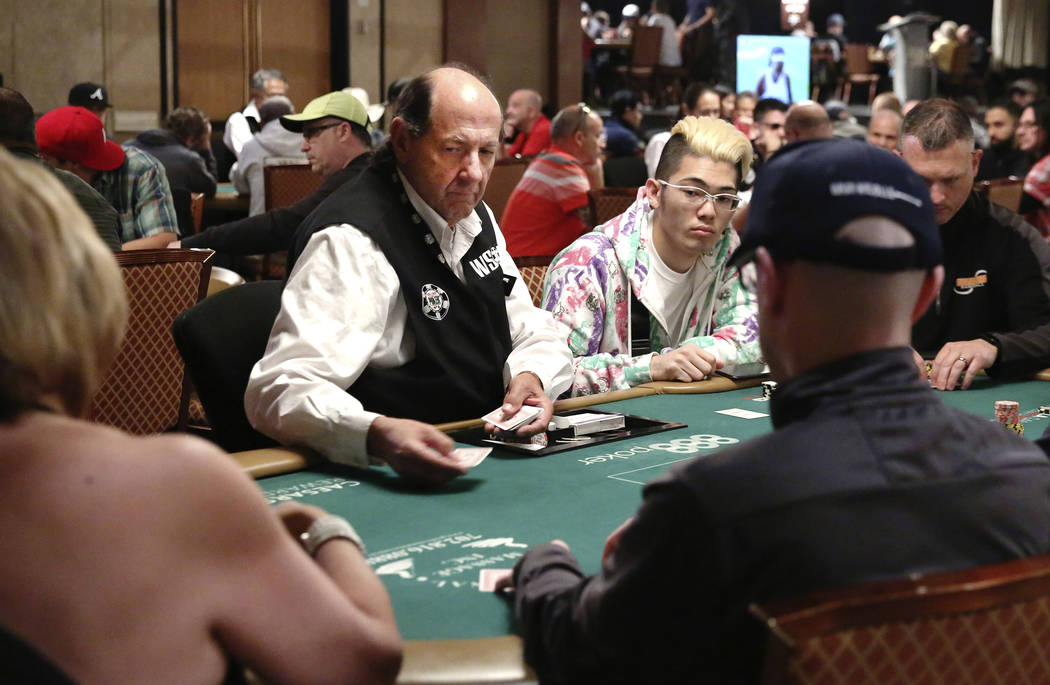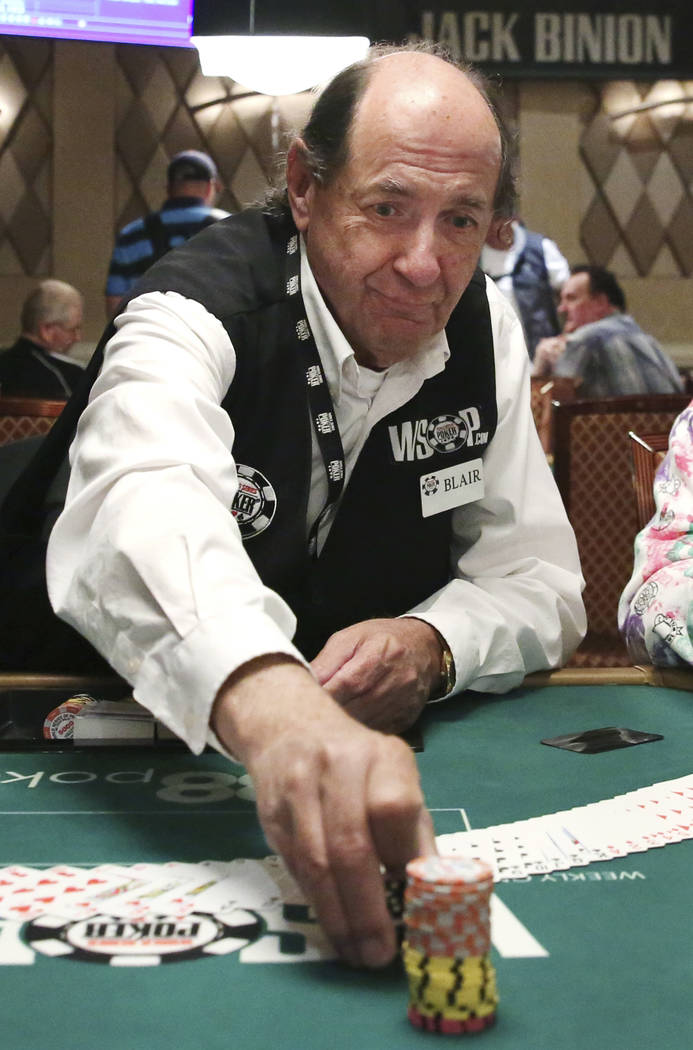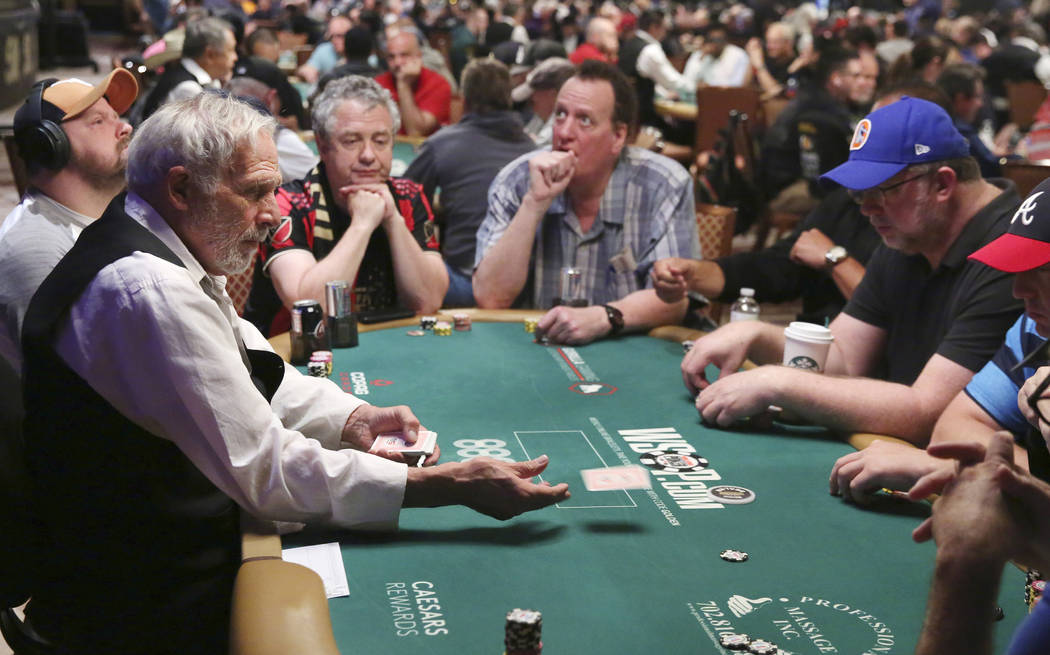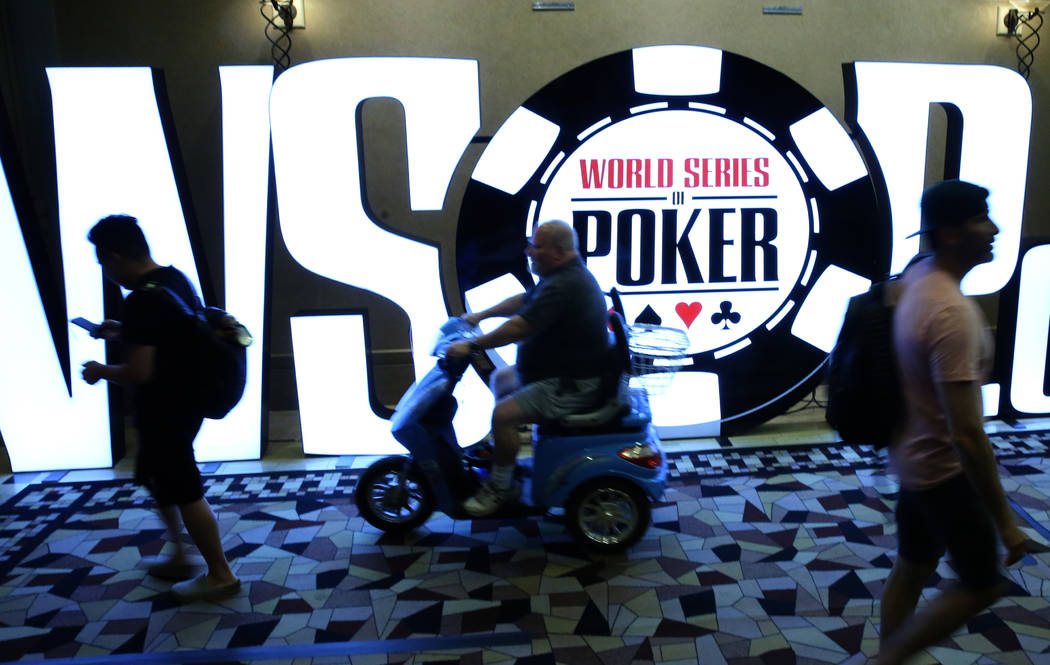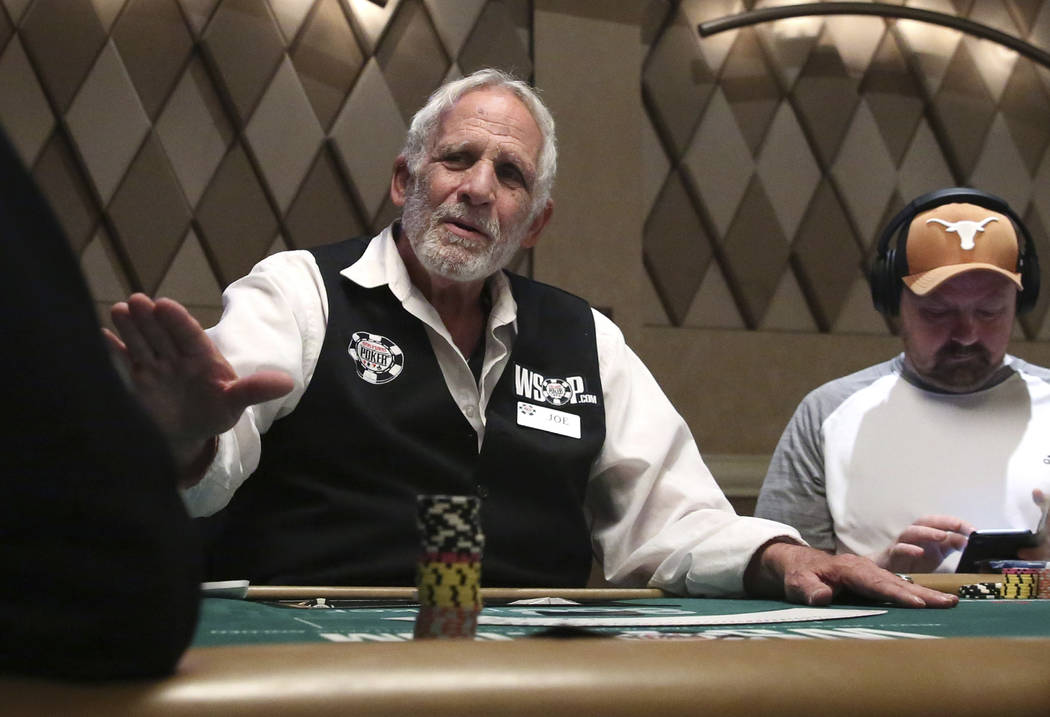Dealers dealt with flying cards, fists in early days of WSOP
In the early years of the World Series of Poker, working the Main Event could be hazardous to a dealer’s health.
“To get to the final table, you were really in trouble. You needed a faceguard,” WSOP dealer Joe Esposito said with a laugh. “I mean, those cards were flying (at dealers’ faces).”
Esposito, 72, moved to Las Vegas from upstate New York in 1970 and has dealt at the WSOP for the last five decades. Likewise, friend and colleague Blair Fedder, 70, moved to Las Vegas from his native Houston in 1970, attended the inaugural WSOP and has dealt at the event for the past 25 years.
On the eve of the 50th WSOP Main Event at the Rio Convention Center, the two veteran dealers have more than few memories about the event, whcih started in 1970 at Binion’s Horseshoe in downtown Las Vegas.
Dollar in a jar
“Poker became tame through the years, but in the old days we had to put a dollar a day into a jar and if you were a player and we got into it and we went outside and got in a fight, I got the money in the jar and a week off,” Esposito said. “But if you lost the fight, you went and got another job because you were too embarrassed to go back to work.
“If a player knew you weren’t going to take his (crap), they don’t give you any (crap). But if they could run over ya, they would run over ya.”
Esposito said late poker great Johnny Moss, who won three of the first five Main Event titles, would frequently request a new dealer in a routine dealers dubbed “getting Mossed.”
“We actually bet on the side how long we’d last before we’d get Mossed,” Esposito said. “If you gave (his opponent) a perfect card, he’d throw you out of the game and say, ‘Send me another dealer.’ If you made it 10 or 15 minutes. you were lucky.”
Fedder said former dealer George Vasilevsky was lucky Moss didn’t shoot him during one heads-up cash game between Moss and a player with deep pockets who flew to Las Vegas to challenge the poker legend.
“George was dealing and it reached a point in the game where Johnny said something that was very unusual. Johnny had four aces and he said to the man, ‘I don’t often do this but if you want to put more money in and you really think you have a great hand, you can go get more money. I’ll let you do that,’” Fedder said. “The man smiled and he leaned across the table and said, ‘John, I’ve got your four aces beat.’ Moss leaned back and sat straight up in his chair. He looked at Vasilevsky and said, ‘Don’t you move. I’m going upstairs to get my gun.’
“Johnny felt that George had set him up. These guys would shoot you if you did that. George never dealt again until Johnny Moss died.”
‘Whisk by my ear’
Fedder said late poker pro John Bonetti was one of the most difficult players to deal with.
“We always like to talk about Bonetti,” he said. “I’ve had John on several occasions where I’ve had cards whisk by my ear. He was always angry.”
By comparison, Fedder said today’s players are “sweethearts.”
“They’re nothing but kids,” he said. “They’re all competing but there’s no rage or hatred here. They’re just playing poker and chatting.”
Despite the differences in demeanor between then and now, Fedder and Esposito said they loved the old days and miss the colorful characters.
“There’s got to be progress but there’s nothing better than Doyle (Brunson) and (Jack) Treetop (Straus),” Esposito said. “They were characters that will never be seen again.”
Esposito said perhaps his favorite character was a relative unknown player known as “Jump Up Jimmy.”
“He’d put all his chips in the pot and jump up and leave,” Esposito said. “This was before pagers and cellphones and they’d have to find him in the casino.”
As hard as the old-school poker pros could be on dealers when they were playing, Fedder said they would always help a dealer in need.
“In the long run, you bonded with these guys and they became very good friends,” he said. “The thing back then was if you needed help, no matter what condition you were in, boom, there was your money.”
Esposito said many of the dealers in the old days were simply poker players who went broke.
“When you got broke in the card room, you’d just put on a white shirt and get in the lineup,” he said. “When someone said, ‘Who’s that?’, they’d say, ‘It’s a dealer auditioning for a job.’
“You had a dozen places you could deal at and by the end of the week you had another $500 or $1,000 to start playing again.”
‘Hiya Tex’
Esposito’s first job at Binion’s was as a “brush,” or a poker room employee who helps players with seating, chips and other tasks. The term orginally referred to cleaning the felt poker tables with a brush.
After work, Esposito would drink across the street at the Pioneer Club, where he struck up a friendship with a guy at the end of the bar who always wore a cowboy hat. Esposito didn’t know at the time that it was Horseshoe owner Benny Binion.
“I’d say ‘Hiya Tex.’ We’d kibbitz and joke and I’ve have a cigarette and offer him a cigarette and he’d take it,” Esposito said. “Eventually he said, ‘I’m not a bum. My family drives me nuts about smoking. Every time I get a pack of cigarettes they throw it away.’ I say, ‘I know you’re not a bum.’
“Then I’m working at the Horseshoe and he walks through the side door. This guy walks up and says, ‘Mr. Binion.’ I thought, ‘Oh my gosh, that’s my boss.’ I didn’t realize who the guy was. As he walks by, he looks at me and goes, ‘I told you I wasn’t a bum.’”
A couple days later, Esposito said Binion told his card room manager to make him a dealer.
“The manager said ‘How do we know he can deal?’ Then (Binion) said, ‘He’ll learn,’” he said. “That was pretty much my introduction to poker.”
Fedder was 21 when he went to Binion’s for the first WSOP and he said the atmosphere was intoxicating.
“Binion’s was an incredible space that was just filled with all this energy of great poker players, scammers, schemers and beautiful women, just all crunched together, and you just soaked it in,” he said. “It became quite addictive to come and play cards.”
Contact reporter Todd Dewey at tdewey@reviewjournal.com. Follow @tdewey33 on Twitter.
50th World Series of Poker Main Event
What: $10,000 buy-in No-limit Texas Hold'em World Championship
When: Wednesday to July 16, with starting flights beginning at noon Wednesday, Thursday and Friday and final table running July 14 to 16
Registration: Open until the start of Day 2 play at 11 a.m. Sunday
Where: Rio Convention Center
TV: Daily on ESPN/ESPN2
2018 champion: John Cynn of Evanston, Illinois
2018 first place prize: $8.8 million
2018 field: 7,874



